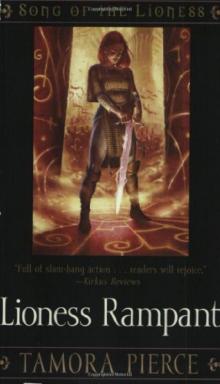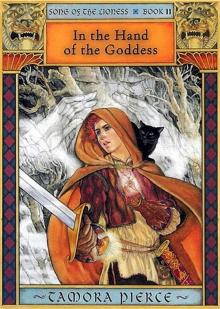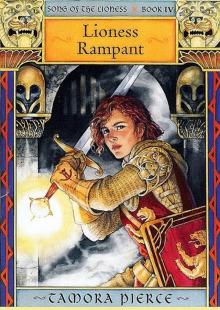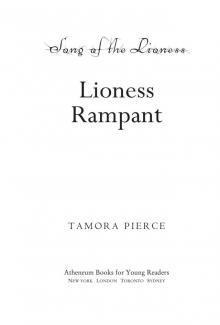- Home
- Tamora Pierce
Squire Page 13
Squire Read online
Page 13
“One hundred gold crowns!” gasped Ebroin of Genlith. “The wench was gone not even a full day!”
“Silence!” barked Duke Turomot, slamming the granite ball on the brass disk. “You lost your right to speak when your master confessed! The Isran woman earns commissions as a dressmaker to ladies, including, at the time of the interference, her royal majesty. I but include due concern for those delayed commissions.”
“Stop whining and get them their filthy money, Ebroin,” snapped Joren. “As far as I’m concerned, this country’s going to the sewer-mucking merchants.” He strode out through the door by which he had entered.
For a moment Kel thought Duke Turomot, rapidly turning purple, would send the Watch to drag him back. King Jonathan cleared his throat. It caught the magistrate’s attention; when he glanced at the thrones, the queen shook her head slightly.
Sir Paxton got to his feet. His face was gray. “Your majesties, your grace”—he looked at Kel—
“Squire Keladry, I beg pardon for my squire’s behavior. I did not know about his crime. Had I known he would act in this fashion, I would have gagged him myself.”
Duke Turomot held up a bony hand that still shook with rage. “No noble is responsible for the utterances of other nobles in court, unless there is proof that they are cohorts in the endeavor under study. You are a knight of good repute and standing with the Crown, Paxton of Nond. It is known that you persuaded your squire to face this court. No one believes you had knowledge of Squire Joren’s behavior. I would suggest, however, that you use the time remaining of his service to school him in humility.”
Sir Paxton bowed and left through the main door.
Turomot looked at Ebroin of Genlith. “Your dispositions, sir?”
Ebroin had been in heated discussion with the Master Advocate. He looked up. “If it please the court, I require three days to raise so great a sum.”
“You have until sunset of the first night of Midwinter,” barked Duke Turomot. “Each half-day you are late, a third of the sum will be added as penalty, subject to the same division as the original sum.”
“A third!” cried Ebroin. He bowed his head as Duke Turomot glared at him. “Very well, my lord Duke.”
Kel had boiled since she heard the sentence. Now she stood. “My lord, I would like a question answered, please.”
The magistrate looked at her. “Speak, Squire Keladry of Mindelan.”
“Did I hear right?” Kel fought to say each word calmly. “Joren had Lalasa kidnapped, roped, gagged, blindfolded, and dragged here and there in the dark. Then she was left on an open platform where she could have rolled into the opening to the stair and fallen to her death, and all he gets is a fine? For the inconvenience?”
“That is the law,” said the duke. “A maidservant belongs to her mistress. Squire Joren deprived you of her services—I understand she worked at that time on a gown for her majesty”—he looked at the queen, who inclined her head—“and caused disruption to her work later as a result of disordered nerves. I remind you the woman was also granted five gold crowns in my judgment.”
“Lady Kel, please, hush,” Lalasa begged, tugging on Kel’s arm. “The ones who did it are going to hard labor, that’s what matters.”
“They wouldn’t have touched you if he hadn’t paid them,” Kel told her. To the magistrate she said, “If he’d kidnapped me he’d have gotten prison or trial by combat.” She clenched her hands so tightly that two griffin wounds reopened. “But for her he tosses a few coins in our laps and goes on his way.”
“Your tone borders on the insubordinate,” Duke Turomot said, his eyes like ice. “My clerk will send you the law pertinent to cases in which nobles interfere with those of common blood under the protection of other nobles. These laws have been in our codes for centuries, squire, worked out by men far wiser than you. If you have no more questions . . .?”
Lalasa and Raoul tugged Kel back down on the bench. “Choose battleground and enemy when you have a chance to win,” Raoul whispered in Kel’s ear. “Mithros himself couldn’t get old Turomot to admit a law is unfair.”
“It’s like me giving you my wages,” Lalasa added softly. “I told you, most nobles keep nearly all of what their servants earn—it’s their right. Maybe you’re too full of ideals to do it, but other nobles aren’t. My lady, don’t make enemies here because of me!”
While they talked, Duke Turomot ended the trial, giving instructions to his clerk and the Master Advocate. Kel sat with her head down, trying to become stone, trying to envision herself as a calm lake. It did no good. She could not let this go without one more try at a protest.
Granite cracked on bronze; she heard the rustle of cloth as everyone got to their feet. King Jonathan stopped to speak quietly to Turomot; the Lord Magistrate nodded. The king gave the queen his arm, and they walked toward the aisle.
Kel stepped around Lalasa.
“Mindelan, don’t do this!” hissed Lord Wyldon.
Kel reddened slightly. She didn’t want to distress him more than Joren had already. Still, she raised her head and said, “Your majesties, may I speak?”
A big hand rested on her shoulder. Raoul said quietly into her ear, “Not in public, Kel. Ask for a private word.”
The monarchs turned. King Jonathan raised his brows. “Squire Keladry?”
Raoul never steered her wrong. “Privately, sire, if possible?” asked Kel, and bowed.
Thayet nodded to her husband. The king looked at Turomot’s clerk. The Lord Magistrate had already vanished into his private chambers.
“Sire, my office is empty, if you will excuse the clutter,” the clerk offered. He went to one of the doors that led off the chamber and opened it with a low bow.
“May I come, too?” Raoul asked softly.
Kel nodded as the monarchs entered the clerk’s chamber. She looked at her maid. “Lalasa?” she asked. “It concerns you.”
Lalasa’s dark face paled. “My lady, I couldn’t. That company’s too grand for the likes of me.”
And besides, I shouldn’t risk the queen taking her custom away if I upset her, Kel realized. She squeezed Lalasa’s hand and followed the monarchs, Raoul at her elbow.
nine
MIDWINTER LUCK
“Don’t confront monarchs in public, Kel,” Raoul murmured. “If you make them look bad in front of those who should fear and obey them, they get nasty. Jonathan’s a good enough sort as kings go, but that doesn’t go far.”
Kel nodded. Her heart thudded in her breast. She couldn’t let this pass. It’s all of a piece with this king, she thought. He doesn’t understand what “fair” means.
The walls in the clerk’s office were lined with shelves of books and papers. A double desk took up much of the open space. The king leaned against it, bracing himself with both hands. Queen Thayet sat in a chair, spreading her blue skirts around her. Raoul shut the courtroom door and leaned against it.
Kel bowed to the monarchs, fighting to keep her emotions from her face if not her spirit. Her hands shook. She stood with them locked behind her, so no one but Raoul could see her weakness.
“What may we do for you, Squire Keladry?” inquired the king, smiling. It was an attractive smile. The king himself was attractive, black-haired and -bearded, with sapphire-blue eyes, fair skin, and a good build for a man who spent his time indoors. His velvet tunic and silk hose matched his eyes; his black silk shirt, full in the sleeves and tight at the cuffs, was elegant.
His looks were wasted on Kel. Dom had prettier eyes and a warmer heart. She could not like Jonathan, though she would serve him and his queen. He had made her take a year of probation as a page when no male had to. He relied on charm to get his way. That summer Lalasa told her that Jonathan’s oldest daughter, Princess Kalasin, had wanted to be the first female page, until her father talked her out of it. Kel wasn’t surprised. She didn’t think much of the man, though she had to admit he was a good king. Maybe her father was right, and good kings weren’t always good men.
“What just happened? It was wrong, sire,” she said firmly. “If Joren had kidnapped me instead of my maid, the legal penalties would have been much worse.”
“Because if a member of the old nobility kidnapped one of the new nobility, it would cause a civil war,” replied the king. “I like to discourage that kind of thing.”
“But by law it’s right that I be paid for the inconvenience of my maid being frightened to death? Not even that she gets the money, but I do? That’s not right. It’s like saying common folk are slaves. Their rights are measured in coin, not justice.” She stopped there, swallowing hard. She’d done her best to keep her voice calm.
For a very long moment the room was silent. Finally the king sighed and crossed his arms. “It’s not right,” he told Kel, to her profound shock. “Only a fool would say that it was. I am called many things,” he admitted with a crooked smile, “but ‘fool’ isn’t one. What do you want?”
Kel swallowed. She was in it this far; it would be silly to blink now. “Change the law, sire.”
“Change the law,” the king repeated. “Squire, what do you think her majesty and I have done ever since we took the thrones? No, don’t answer—I dread to think what you might have the courage to say. We have been trying to change laws—not this particular one, but many like it.” He smiled bitterly. “The problem is that monarchs who wish to live until their grandchildren are born do not hand down any law they like. We must treat with our nobles, who are equipped to go to war against us; we must compromise with them. We must treat and compromise with merchants, who give loans for pet projects such as dredging Port Legann’s harbor. We compromise and treat with farmers, who feed us, and street people, who can burn a city down. There are priests and priestesses, who can tell people the gods have turned their faces from the Crown, so they need not obey us. And the mages—I’ll leave it to your imagination what mages will do when angered. Any law Thayet and I propose offends someone. We must balance opposing forces. Our successes vary.”
Kel blinked. She had never guessed that even the lowliest could exact revenge against their betters, if they didn’t mind its cost. “My point is the same, Your Majesty,” she repeated. “This particular law is just plain bad.”
“We could use the story of Lalasa’s kidnapping to stir up sentiment for a revision,” the king murmured. “My dear? Your opinion?”
“Keladry’s right,” replied Queen Thayet in her cool, direct manner. “This stinks of slavery. We could get the Mithrans’ support—just say we’re making it so the same law applies to all. The Goddess’s temples will see it as greater protection for female servants.”
“I’d hoped you’d want to spare us another battle with the nobility,” murmured her husband and co-ruler. “Raoul? Come on, old man, voice an opinion if you dare.”
“Now, Jon, you know I have opinions all the time,” said Kel’s knight-master. “I just don’t air them when you’ve got your ears closed. I’d as soon save my breath.”
“And?” the king demanded.
“I’m with Kel,” Raoul told him. “The scene we saw in there reeked. That piece of rat dung knew before he came that the worst he would get was a fine. He used that to make the courts and the Crown look stupid.”
The king winced. “Don’t soften your words to spare me,” he said drily. “Just speak your mind.”
“Stone Mountain can pay fifty times that without a cramp,” Raoul said “Old Turomot laid on all the extras he could, and it still didn’t faze Joren. I thought that adding Lalasa’s dressmaking to raise the fine was inspired, myself.”
“You think Turomot would look into changing the law?” Jonathan inquired. “Usually I have to wheedle and grant all kinds of concessions before he’ll so much as ask his clerks to look up precedents. He’s the stickiest of the conservatives.”
“Who just got told by a whelp that he’d given way to royal pressure,” Raoul pointed out. “I think right now old Turomot would love to rewrite this law, just in case Squire Joren tries a similar trick one day.”
“So there you have it, Keladry,” said the king.
Kel blinked, startled to be addressed. She had been dazzled by the speedy discussion. If this was how kingdoms were ruled and people’s fates were decided, she wouldn’t be happy until she was in Peachblossom’s saddle and as far from the palace as she could manage. “Sire?” she asked politely.
“We cannot change the solution in Lalasa’s case. We can set the process of change in motion. It’s slow—”
“Painfully,” remarked the queen.
The king nodded. “But in the end the law will change.”
“That’s a start,” Kel agreed.
“There’s a price, my dear,” King Jonathan said, capturing her eyes with his own. “In case you were going to challenge Squire Joren, as is your right under ancient custom . . .” He shook his head. “Unacceptable. This chat we’ve had is about how things must change from the rule of privilege to the rule of law for all. It means you must be content to have your quarrels settled by law, not by privilege.”
He was right, curse him, thought Kel. If the country were to be governed by one set of laws, there could be exceptions for no one. She would have to accept the law’s justice, even when she thought it unfair. Her intent to beat the tar out of Joren had to stay a happy fantasy.
“Very well, your majesty,” she said. “If you keep your word to change this particular law, I won’t challenge Joren.”
The king extended his hands. Kel wasn’t sure what he wanted until Raoul nudged her. Then she realized the king wanted her to swear.
She put her hands in his and knelt. “I, Keladry of Mindelan, will forego my privilege to challenge Joren of Stone Mountain, as long as work for a change in that law is made,” she said, meeting the king’s eyes.
“And I, Jonathan of Conté, do swear on my own behalf and that of Queen Thayet to do all in the Crown’s power to have that law changed,” replied the king solemnly. “Do you keep faith with me, and I will keep faith with you.”
Dismissed from the clerk’s office, Kel found Jump whining at the courtroom door. There was a new set of four parallel scratches, fresh and bloody, across the old scars on his heavy muzzle, and a frantic look in his tiny eyes. Kel didn’t need to talk to animals like Daine to know there was trouble at home. She followed Jump through the crowded palace at a trot, barely noticing the looks she was given as she passed.
She heard battle before she saw it, sparrow shrieks and the yowls and rasps of an angry young griffin. She burst into her room. The griffin’s platform was knocked over, the contents of his dishes scattered on the floor. The griffin himself alternately stood on his hind legs, wings spread, trying to grab sparrows as the birds circled and attacked his head, or hunkered down to protect his eyes. Pinpoints of blood dotted the feathers on his face, showing where his foes had scored a touch. He stood in front of Kel’s desk and would not move. Behind him, in the hollow where she put her legs as she worked, Kel heard frantic peeping.
She yanked the coverlet from her bed and threw it over the immortal. The sparrows scattered as it descended. As the griffin thrashed against the heavy folds, Kel knelt to look under the desk. He had trapped one of the male sparrows there. One of the bird’s wings trailed on the ground, marked like Jump by a griffin claw.
Kel brought the captive out, cuddling him in her hands. She had named this one Arrow, because the black bib at his throat was shaped like an arrowhead. “Find Daine, somebody,” she ordered. Three sparrows zipped out a small window that stood open.
Kel whipped the coverlet off the griffin, knocking him on his back. He struggled to his feet with a hiss, his copper-colored eyes hot.
Kel spanked the griffin as she would a puppy or kitten, loudly rather than hard. She made sure he saw Arrow so he would connect the sparrow with the punishment—she hoped. Finally she let him escape to the well in the desk where he’d held the sparrow. There he spread his wings in a mantling gesture, cawing at Jump, as if he kn
ew the dog had brought Kel. Holding Arrow against her chest, she poked up the fire, then got a clean cloth. She wadded up the cloth and put the sparrow in it, settling him in her lap.
Suddenly tears spilled from her eyes. It was too much—the griffin, her normal duties, the trial, even her talk with the king. If only someone could help with the griffin! But Daine was the only one who could deal with the grudge held by griffin parents, and she was far busier than Kel.
Arrow peeped with alarm. “It’s just monthly glooms,” Kel said, wiping her eyes on her sleeve. “Human females get them. I should be as brave as you, defying a griffin.”
Daine came and went, leaving behind her a healed sparrow and a griffin with—she and Kel hoped—an aversion to killing small birds. When Raoul knocked on the connecting door, Kel was cleaning up the mess.
“Trouble with the monster?” Raoul asked kindly.
Kel scowled at the griffin, still in his wooden prison with Jump as guard. “All mended, we hope.”
Raoul leaned against the door frame, hands stuffed in his pockets. “Do you want help with him? He won’t take food, but I could transport him and look after him. I can certainly defend myself from his family.”
Kel smiled gratefully at him. It was typical of him to offer. “You’re very kind, sir, but we’ll muddle along. At least now we can hope he won’t be hunting sparrows.” Remembering her duty, she asked, “Did you need me for something?” She looked at the dog. “Jump, let him out.”
Jump growled at his captive; the griffin hissed. As soon as Jump moved, the griffin stalked out from under the desk, pumped his wings, and hopped onto a chair, up to its back, then onto his platform. There he spread his wings, hissed at Kel, and began to groom himself.

 Lady Knight
Lady Knight Street Magic
Street Magic Bloodhound
Bloodhound Magic Steps
Magic Steps Alanna: The First Adventure
Alanna: The First Adventure Emperor Mage
Emperor Mage The Will of the Empress
The Will of the Empress The Realms of the Gods
The Realms of the Gods In the Hand of the Goddess
In the Hand of the Goddess Tris's Book
Tris's Book Cold Fire
Cold Fire Sandry's Book
Sandry's Book Wild Magic
Wild Magic Lioness Rampant
Lioness Rampant The Woman Who Rides Like a Man
The Woman Who Rides Like a Man First Test
First Test Tempests and Slaughter
Tempests and Slaughter Terrier
Terrier Trickster's Queen
Trickster's Queen Squire
Squire Briar's Book
Briar's Book Battle Magic
Battle Magic Page
Page Melting Stones
Melting Stones Wolf-Speaker
Wolf-Speaker Mastiff
Mastiff The Song Of The Lioness Quartet #1 - Alanna - The First Adventure
The Song Of The Lioness Quartet #1 - Alanna - The First Adventure The Circle Opens #2: Street Magic: Street Magic - Reissue
The Circle Opens #2: Street Magic: Street Magic - Reissue Tortall 1 - Song Of The Lioness #2 - In The Hand of the Goddess
Tortall 1 - Song Of The Lioness #2 - In The Hand of the Goddess Protector of the Small Quartet
Protector of the Small Quartet Beka Cooper 1 - Terrier
Beka Cooper 1 - Terrier Alanna
Alanna Trickster's Choice
Trickster's Choice Circle Opens #03: Cold Fire
Circle Opens #03: Cold Fire In the Hand of the Goddess (The Song of the Lioness)
In the Hand of the Goddess (The Song of the Lioness) Song of the Lioness #4 - Lioness Rampant
Song of the Lioness #4 - Lioness Rampant Young Warriors
Young Warriors Tortall
Tortall Lioness Rampant (Song of the Lioness)
Lioness Rampant (Song of the Lioness) Melting Stones (Circle Reforged)
Melting Stones (Circle Reforged) The Circle Opens #4: Shatterglass
The Circle Opens #4: Shatterglass